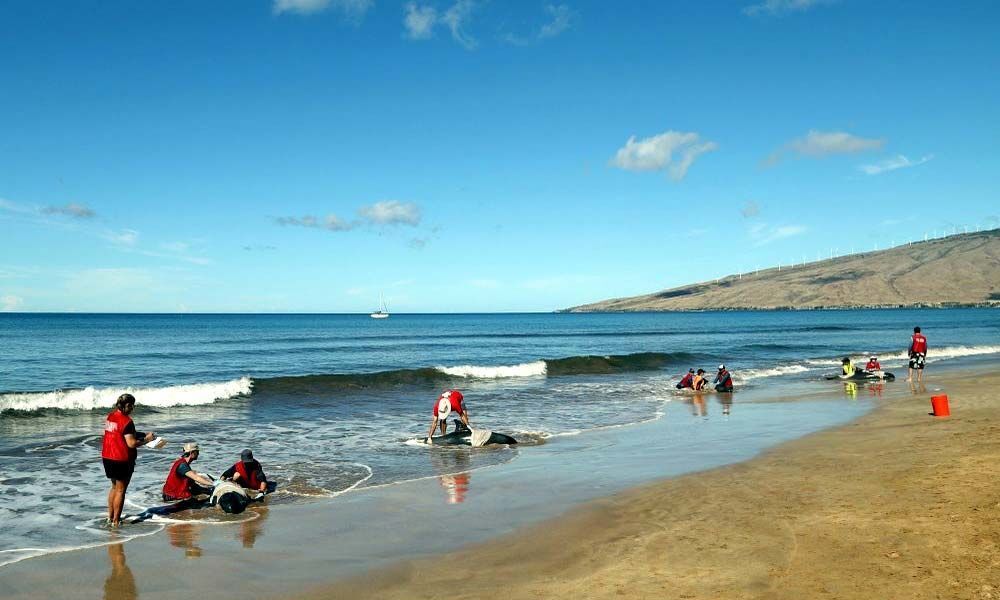5 whales dead after mass stranding on Maui beach

Five whales died, including four that were euthanized, after a mass stranding Thursday on a beach on the Hawaii island of Maui.
HONOLULU: Five whales died, including four that were euthanized, after a mass stranding Thursday on a beach on the Hawaii island of Maui.
Ten melon-headed whales were found stranded alive early in the morning on Sugar Beach in the coastal resort community of Kihei.
Hours later, a whale calf believed to belong to the same social group was found dead on the beach about a mile to the north, said David Schofield, the regional marine mammal response coordinator for the National Oceanic and Atmospheric Administration.
NOAA veterinarians determined four of the whales were in grave condition and nothing more could be done to save them, Jeffrey Walters, NOAA's wildlife management and conservation branch, said in a statement.
The animals were made comfortable with a sedative and then humanely euthanized to relieve their suffering, he said.
The remaining six whales were refloated to the ocean but stranded again, Schofield said. NOAA initially said the prognosis for two of the six wasn't good, but they eventually made it out.
Officials plan to monitor the area on Friday just in case they return. One or two of the six is likely debilitated, he said.
"The last time we saw them they seemed to be moving in a healthy manner to deeper waters. So it's our hope that they got their bearings about them and were able to head out to sea," Schofield said.
Walters said NOAA and University of Hawaii scientists will examine the whales to determine what caused the stranding.
Kealoha Pisciotta, a Native Hawaiian cultural practitioner, objected to the euthanizing of the whales, animals she said are a manifestation of the sea god Kanaloa.
She and others wanted to hold up the whales in the water so they could recover and swim away or die dignified deaths. But she said NOAA officials wouldn't let them near the whales.
"All we're seeking to do is have a relationship with our Kanaloa," she said.
Walters said NOAA worked closely with Hawaiian cultural practitioners, who prayed before and after the whales were euthanized.
"We will continue to work with practitioners and other community members to the maximum extent possible, while we fulfill our mandate to conduct stranding response and post-mortem exams under the Marine Mammal Protection Act," Walters said.
Pisciotta said nine practitioners were at the scene and performed a death rite, in which they called to the ancestors and akua or gods, so the whales could be taken quickly. She said they only performed the rite because the animals were being killed. She said the practitioners never agreed to the euthanizing.
"We're not saying you cannot do a necropsy, we're just saying just give them a chance to die normally," she said.
Melon-headed whales are found in deep, tropical waters worldwide. They grow to be about 9 feet (3 meters) long and are named for the bulge in their foreheads.
There are an estimated 400 of the animals in the Hawaiian Islands.
The last time this many marine mammals stranded together in Hawaii was two years ago, when five pilot whales died in Kauai's Nawiliwili Harbor. The cause of this stranding is still being investigated.
Before that, about 150 melon-headed whales nearly stranded at Kauai's Hanalei Bay in 2004. One whale died.
NOAA's report on that incident said Navy sonar may have contributed to the near-stranding, but officials lacked evidence to conclusively show the technology triggered it.
The report, which was published in 2006, said nearby predators or other factors may have also contributed to the incident. The Navy was hosting its biennial Rim of the Pacific military exercises in Hawaii water at the time.

